
Ethics and Information Technology
Scope & Guideline
Illuminating the Ethical Pathways of Digital Transformation
Introduction
Aims and Scopes
- Ethical implications of emerging technologies:
The journal examines the ethical challenges posed by new technologies such as artificial intelligence, blockchain, and data analytics, exploring how these innovations affect privacy, autonomy, and societal norms. - Impact of technology on society:
It investigates how technological advancements influence social structures, relationships, and individual behaviors, emphasizing the need for ethical frameworks to guide these changes. - Interdisciplinary approaches to technology ethics:
The journal promotes interdisciplinary research that combines insights from philosophy, law, sociology, and technology studies to address complex ethical dilemmas associated with information technology. - Focus on policy and governance:
It addresses the regulatory and policy implications of technology, advocating for responsible governance that aligns technological development with ethical considerations. - Human-centered design and value-sensitive design:
The journal emphasizes the importance of incorporating human values into the design and deployment of technological systems, ensuring that they serve the public good.
Trending and Emerging
- AI ethics and accountability:
The journal increasingly focuses on the ethical implications of artificial intelligence, emphasizing accountability, transparency, and the societal impacts of AI systems. - Data ethics and governance:
There is a growing emphasis on ethical frameworks governing data use, including issues of consent, data ownership, and the implications of big data analytics. - Social justice and technology:
Emerging themes explore how technology intersects with issues of social justice, including discussions on algorithmic bias, equity in AI, and the ethical implications of surveillance technologies. - Digital citizenship and rights:
The journal is exploring concepts of digital citizenship, focusing on the rights and responsibilities of individuals in increasingly digital societies, including the ethical dimensions of online interactions. - Interdisciplinary approaches to ethical design:
There is a trend towards employing interdisciplinary methodologies that integrate diverse perspectives on technology ethics, emphasizing collaboration across fields such as philosophy, engineering, and social science.
Declining or Waning
- Traditional privacy debates:
Discussions centered around basic privacy concerns are becoming less frequent as more nuanced issues, such as data ethics and algorithmic accountability, gain attention. - Human-robot interaction ethics:
While the ethical implications of human-robot interactions were once a major focus, the rise of AI and machine learning has shifted the conversation towards broader implications of AI systems, leading to reduced emphasis on specific robot ethics. - Ethics of video games:
The exploration of ethical issues specifically related to video games, such as violence and morality in gaming, has decreased as the journal pivots towards more pressing concerns in AI and data ethics. - Regulatory frameworks for traditional technologies:
As the focus shifts to emerging technologies, discussions surrounding regulations for older technologies (like traditional software systems) appear to be declining in frequency. - Normative ethics in technology:
The application of classical normative ethical theories (like utilitarianism and deontology) in technology-related discussions is waning, with a greater emphasis on practical implications and real-world applications.
Similar Journals

Information
Cultivating a community of information pioneers.Information is a distinguished open-access journal published by MDPI since 2010, dedicated to advancing the field of Information Systems. With its E-ISSN 2078-2489, the journal serves as a crucial platform for researchers, professionals, and students to disseminate and access innovative research and methodologies in the domain of information science, data management, and technology. Based in Basel, Switzerland, the journal has established a commendable reputation in the academic community, currently holding a Q2 ranking in the prestigious Scopus category of Information Systems, and occupies the 74th percentile among its peers. The breadth of the journal's objectives is to promote and facilitate the open exchange of ideas, research findings, and emerging trends, fostering collaboration and knowledge growth in a rapidly evolving digital landscape. With an unwavering commitment to high-quality scholarship and accessible knowledge, Information plays an essential role in shaping the future of the information sciences.
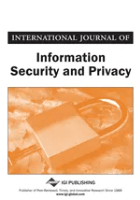
International Journal of Information Security and Privacy
Uncovering Best Practices in Information SecurityInternational Journal of Information Security and Privacy is a pivotal resource for scholars and practitioners in the rapidly evolving field of information systems. Published by IGI Global, this esteemed journal, identifiable by its ISSN 1930-1650 (E-ISSN 1930-1669), explores critical aspects of information security and privacy, focusing on innovative approaches, technologies, and best practices that safeguard data in an increasingly digital world. Since its inception in 2007, it has contributed significantly to academic discourse, addressing major challenges faced by organizations and individuals alike. Although it currently ranks in the Q4 quartile and occupies the 249th position out of 394 in the Scopus computer science category, the journal has a commendable reach and continues to attract impactful research. As part of its commitment to advancing knowledge, the journal encourages contributions that deliver actionable insights, making it an ideal platform for researchers, professionals, and students interested in the forefront of information security. Engaging with this journal provides access to the latest findings and methodologies while offering a space for the exchange of transformative ideas in the realm of information privacy.

Informatics for Health & Social Care
Bridging gaps in health and social care through knowledge.Informatics for Health & Social Care is a leading journal published by Taylor & Francis Inc, dedicated to the intersection of health informatics and social care. With a strong emphasis on advancing knowledge in the fields of health information management and nursing, this journal has established itself as a vital resource for researchers and professionals seeking to explore innovative applications of informatics to improve patient outcomes and streamline healthcare delivery. Recognized for its influential contributions, it currently holds a Q2 ranking in both Health Informatics and Health Information Management, as well as a prestigious Q1 ranking in Nursing (miscellaneous) for 2023, signifying its critical role within the academic community. The journal is accessible for open access viewing, fostering a broader dissemination of research findings. Released continuously since 1976, it stands as a testament to the evolving landscape of health informatics, addressing pertinent issues and facilitating discussions that shape practices in health and social care delivery.
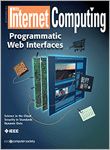
IEEE INTERNET COMPUTING
Unveiling Trends in Internet TechnologyIEEE Internet Computing is a prominent journal in the field of computer networks and communications, published by the esteemed IEEE Computer Society. With an impressive impact factor and ranking in the Q1 category for 2023, it stands out as a vital resource for researchers, professionals, and students alike, seeking to delve into the latest advancements and trends in internet computing. Since its inception in 1997, the journal has provided a platform for pioneering studies and insightful discussions that bridge theory and practice in the rapidly evolving digital landscape. The journal is indexed with an excellent Scopus rank of #77 out of 395, placing it in the 80th percentile of its category, which underlines its relevance and influence in the academic community. While it currently does not offer Open Access options, its rich archive of scholarly articles remains accessible to those affiliated with research institutions and libraries. Furthermore, the journal's comprehensive coverage continues through 2024, ensuring it remains at the forefront of the discipline.

Tecnoscienza-Italian Journal of Science & Technology Studies
Illuminating the Impact of Innovation on Society.Tecnoscienza - Italian Journal of Science & Technology Studies is an esteemed open-access journal published by TECNOSCIENZA since 2010, dedicated to the interdisciplinary field of science and technology studies. With a focus on the sociocultural implications of scientific advancements, the journal serves as a crucial platform for researchers, professionals, and students alike to engage with contemporary issues at the intersection of technology and society. The journal is indexed with an increasing presence in recognized databases, achieving a commendable ranking across several categories in Scopus for the year 2023, including Q3 in Communication and Social Sciences (miscellaneous). Although it primarily engages with themes in sociology and political science, it invites submissions that explore the broader implications of technology in various sectors. By facilitating open access to its content, Tecnoscienza aims to contribute significantly to the ongoing discourse on the role of science and technology in shaping societal frameworks, making it an invaluable resource for those invested in understanding these dynamic fields.

Journal of the Association for Information Systems
Pioneering Insights in Computer Science ApplicationsThe Journal of the Association for Information Systems (ISSN: 1536-9323, E-ISSN: 1558-3457) is a premier academic publication dedicated to advancing the field of information systems and computer science applications. Published by the Association for Information Systems in the United States, this journal has established itself as a leading source of cutting-edge research, evidenced by its strong impact factor and recognition as a Q1 journal in both Computer Science Applications and Information Systems categories for 2023. With a commendable Scopus ranking of #82/817 in Computer Science Applications (90th percentile) and #43/394 in Information Systems (89th percentile), the journal serves as a vital platform for the dissemination of innovative ideas and practices that shape contemporary information systems research. Although it operates on a traditional access model, the journal remains committed to fostering scholarly communication and providing insights that are instrumental for researchers, professionals, and students alike. Its scope encompasses a diverse range of topics within the field, making it an essential resource for anyone seeking to deepen their understanding of information systems in our rapidly evolving digital landscape.
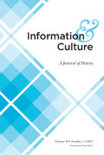
Information & Culture
Advancing Scholarship in Information and ConservationInformation & Culture is a respected journal published by University of Texas Press, focusing on the rich intersections between conservation, history, and library and information sciences. With a robust E-ISSN of 2166-3033, this journal has established itself as a vital resource for researchers, professionals, and students alike, providing a platform for innovative scholarship since its inception in 2012. The journal has garnered admirable rankings, achieving a Q2 category in both Conservation and History, alongside a Q3 ranking in Library and Information Sciences, reflecting its quality and relevance in the academic community. Its placement within the Scopus rankings further highlights its significance, with notable positions in the 79th percentile for Arts and Humanities and the 63rd percentile for Conservation. As a testament to its commitment to accessible knowledge, the journal offers various access options, catering to a wide audience eager to explore the evolving landscape of information and cultural studies.
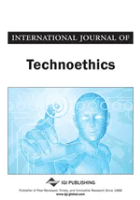
International Journal of Technoethics
Exploring the ethical dimensions of technological innovation.International Journal of Technoethics, published by IGI Global, stands at the forefront of interdisciplinary research, bridging the fields of technology, ethics, and society. With an ISSN of 1947-3451 and an E-ISSN of 1947-346X, this celebrated journal focuses on the critical examination of ethical issues emerging from technological advancements, propelling discourse among researchers, professionals, and students alike. Since its inception in 2010, it has thrived in esteemed categories, boasting a Q2 ranking in both Engineering (miscellaneous) and Social Sciences (miscellaneous), with impressive Scopus rankings placing it in the top 12% and 27% within these fields respectively. With the aim of fostering a deeper understanding of technology's impact on society, the journal provides a platform for scholarly articles, case studies, and comprehensive reviews, contributing significantly to the global conversation on technoethics. Published from the United States, International Journal of Technoethics is pivotal for those seeking to navigate the complexities of innovation while maintaining a strong ethical foundation.
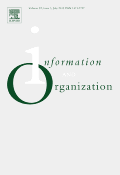
Information and Organization
Connecting Scholars and Practitioners in Information ScienceInformation and Organization is a leading academic journal published by ELSEVIER SCI LTD, specializing in the dynamic fields of Information Systems, Library and Information Sciences, Management Information Systems, and Organizational Behavior. With an impressive Impact Factor that reflects its esteemed reputation, this journal enjoys a Q1 ranking in multiple categories, highlighting its significance in both research and practical applications. Established in 1996, the journal has paved the way for innovative research, fostering a community of scholars and practitioners who are dedicated to exploring contemporary challenges and opportunities in information management and organizational practices. While primarily available through subscription, the journal's impact resonates globally, making it an essential resource for researchers, professionals, and students eager to advance their knowledge and contribute to the evolving discourse in these crucial areas. With its rigorous peer-review process and a focus on cutting-edge topics, Information and Organization is committed to disseminating high-quality research that informs practice and policy, ensuring its critical role in shaping the future of information and organizational studies.

Computer Science and Information Systems
Bridging Theory and Practice in Information SystemsComputer Science and Information Systems, an esteemed journal published by the COMSIS CONSORTIUM, serves as a vital platform for researchers and practitioners within the field of computer science and information systems. With an ISSN of 1820-0214, this open access journal has been disseminating high-quality research since 2004, making scholarly content readily accessible to a global audience. Based in Novi Sad, Serbia, the journal has established itself as a point of reference in the academic community, achieving a Q3 ranking in the Computer Science (miscellaneous) category as of 2023. With its coverage spanning from 2008 to 2024, it caters to a diverse range of topics, including software engineering, data processing, and system architecture. Although the HIndex is currently not available, the journal holds a respectable 43rd percentile ranking in the Scopus database for general computer science, showcasing its relevance in the field. By offering an open access model, it ensures that groundbreaking research can be freely accessed and utilized, fostering innovation and collaboration across disciplines.